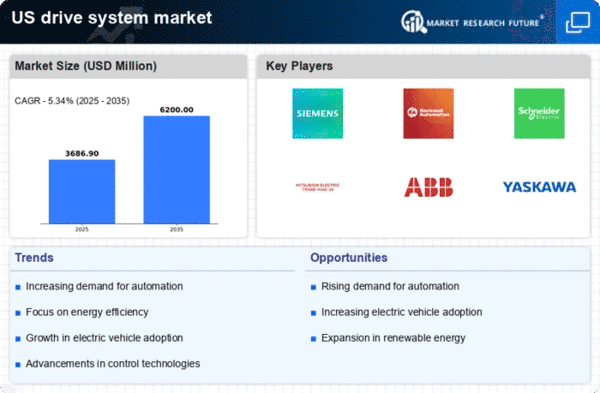Growth of Electric Vehicles
The drive system market is experiencing a transformative phase due to the rapid growth of electric vehicles (EVs) in the United States. As consumer preferences shift towards sustainable transportation options, the demand for electric drive systems is escalating. The EV market is projected to grow at a CAGR of approximately 20% over the next decade, significantly impacting the drive system market. This growth is driven by advancements in battery technology, government incentives, and increasing environmental awareness among consumers. Consequently, manufacturers are focusing on developing high-performance drive systems tailored for electric vehicles, which are essential for enhancing efficiency and range. The expansion of the EV market is likely to create substantial opportunities for drive system suppliers, further propelling the overall growth of the drive system market.
Rising Demand for Automation
the drive system market is witnessing a significant increase in demand for automation across multiple industries.. This trend is primarily driven by the need for increased efficiency and productivity in manufacturing processes. Automation technologies, such as robotics and advanced control systems, are being integrated into production lines, leading to a projected growth rate of approximately 8% annually in the drive system market. As companies strive to enhance operational capabilities, the adoption of automated drive systems is becoming essential. Furthermore, the push for smart manufacturing solutions is likely to propel investments in drive systems, as businesses seek to optimize their operations and reduce labor costs. This growing inclination towards automation is expected to significantly influence the drive system market, fostering innovation and technological advancements.
Increased Focus on Safety Standards
The drive system market is influenced by a heightened focus on safety standards and regulations across industries. As companies prioritize workplace safety, the demand for drive systems that comply with stringent safety requirements is on the rise. This trend is particularly evident in sectors such as manufacturing, automotive, and aerospace, where the implementation of safety protocols is critical. The market is witnessing a shift towards drive systems that incorporate safety features, such as emergency stop functions and overload protection. This increased emphasis on safety is expected to drive market growth, as organizations invest in systems that not only enhance productivity but also ensure the well-being of their workforce. Consequently, the drive system market is likely to benefit from this growing awareness of safety standards.
Expansion of Renewable Energy Sources
the drive system market is expected to grow significantly as the United States places greater emphasis on renewable energy sources.. As the nation transitions towards sustainable energy solutions, the demand for drive systems in wind and solar energy applications is expected to rise. The integration of drive systems in renewable energy projects enhances efficiency and reliability, contributing to the overall performance of these systems. According to recent data, investments in renewable energy are projected to reach $500 billion by 2030, creating substantial opportunities for drive system manufacturers. This shift towards clean energy not only aligns with environmental goals but also stimulates the drive system market, as companies seek to develop innovative solutions that support the growth of renewable energy infrastructure.
Technological Advancements in Drive Systems
Technological advancements are significantly shaping the drive system market, leading to the development of more efficient and reliable systems. Innovations such as digitalization, IoT integration, and advanced materials are enhancing the performance of drive systems across various applications. For instance, the introduction of smart drive systems equipped with sensors and connectivity features allows for real-time monitoring and predictive maintenance, reducing downtime and operational costs. The market is expected to witness a compound annual growth rate (CAGR) of around 7% over the next five years, driven by these technological improvements. As industries increasingly adopt these advanced drive systems, the market is likely to expand, fostering competition and encouraging further innovation within the drive system market.
















